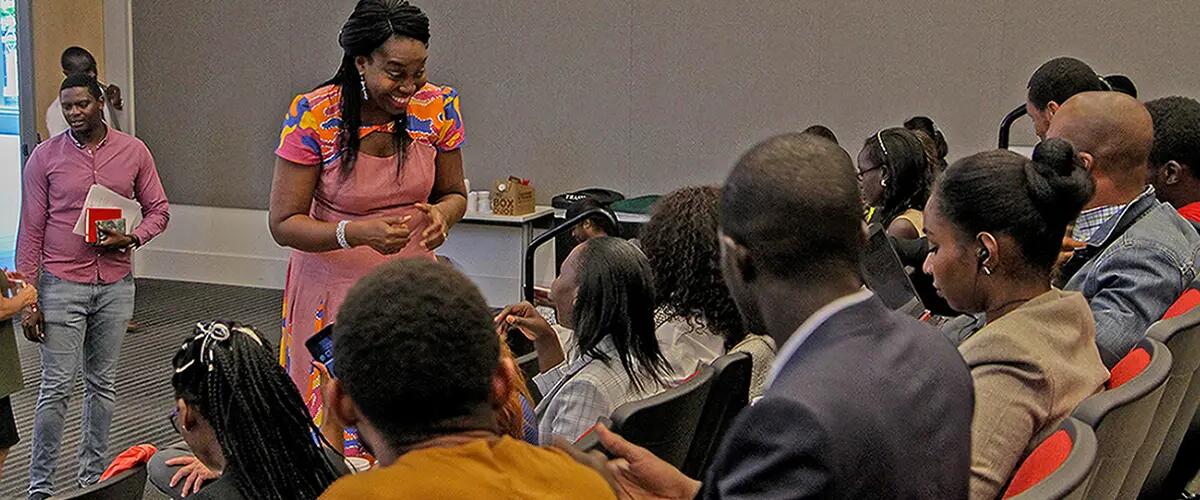
The Mandela Washington Fellows attending a special women's leadership symposium at Rutgers.
Leadership lessons from the perspective of women
By Matheus Hamutenya
New Brunswick – A women’s leadership symposium presented a chance for 50 young African professionals attending the Mandela Washington Fellowship to delve into women’s issues, and the message from the speakers of the day was clear, find your voice, find your reason for existence and run with it.
The symposium hosted by Rutgers University gave the fellows an opportunity to engage with various American leaders about women’s leadership and other important issues affecting women and society at large.
The fellows got a real sense of the situation on the ground in America, especially for women and men of color, as four invited guests shared their leadership journeys.
Marcia Brown, a lawyer and vice chancellor for external and governmental relations at Rutgers University-Newark, shared an inspiring story of how she came from a small village to become the first person from her family to go to college. While she was quick to note that while things are better than before, the struggle for women empowerment continues, with women still lagging behind their male counterparts when they hold positions of power.
“How many men here are ready to accept the leadership of women? How many men in here have accepted the leadership of women and are willing to work under the leadership of women,” she asked.

With only a few women in leadership positions, women’s work is generally overlooked by society, which she said leaves women to often feel like they do not have a platform to express themselves, Brown said. This needs to change, she said. She challenged the leaders in attendance to create conducive environments in their communities where women can thrive and have a voice.
“There are a lot of women who are doing great things who do not have a voice, who are not being acknowledged, and we need to create opportunities so that women can have their voice,” she said. Those of us with access to opportunities, those of us with voices have the responsibility to make things better for those without.”
She also highlighted the importance of bringing men to the table when discussing matters that affect women, saying men have a valuable contribution to make towards women empowerment. Women want an economy that works for everyone, and they want to be paid the same wages as men.
“We feel men have a value and contribution to make if they believe that this is the right thing to do, we need to have a conversation that is inclusive, we don’t want to create barriers between us and them,” she said.
Brown also said she was impressed by the work being done by the fellows in their countries, and she encouraged them to do their part to ensure a better life for everyone in their communities, especially women, saying the fact that they were selected to be part of the fellowship is testament to their capabilities.
She reminded the young African leaders that their being in the U.S. is not by chance, adding that being part of the fellowship means they have an opportunity and an obligation to make connections that will strengthen their voices, as well as their organizational work and that it is now up to them to live up to the expectations.
“You are here because you are doing things that impact your communities positively, you did not just roll out of your beds and end up here. You all know that to whom much is given, much is expected, so a free ride over here means an opportunity to do something over there,” she said.
Daphnee Fleurant, associate director and human resources business partner at Merck, spoke about access to opportunities for women and people of color in general, saying access to opportunities for minority groups still remains a problem in the U.S.
“We do not have equal access to opportunities, and it is not because we do not have enough talented black people or women,” she said. “It’s due to the way things are structured.”
She said significant strides are being made to ensure that everyone has equal access to opportunities, and she strongly urged minorities to grab opportunities and not feel like they are being given opportunities on a silver platter due to any affirmative action schemes.
“So when people say you only got this opportunity because you tick all the boxes, that is their perception, but understand that you have the talent and skill and you are now just being given the same opportunity,” she said. “Do not let other people’s perception stop you from taking an opportunity to prove yourself, because everybody else that has reached that level is there because they had the opportunity, and you are just being given that opportunity.”

An Army veteran, Fleurant explained how the military deals with inclusion. She said the military is getting more inclusive albeit by force as fewer people are interested in serving.
“The pool of people in the U.S. interested in joining the military is not that good. They have already reached the male population and hence the increase in the number of women, they have already penetrated a certain market and thus they have to find a new market to be in tune with, and I think they are slowly making those adjustments because they still need to fulfil their purpose and they need those numbers to do that,” she said.
Dr. Omowunmi Osinubi, president of Occupational and Environmental Health Associates, Inc., also stressed the value of having a voice.
“I encourage you all to find your voice, your voice is really important, because that is what is going to communicate your ideas and visions, that is what is going to galvanize and mobilize people to support your activities and whatever you do,” she said.
Osinubi also called on the young leaders to find their identity and their reason for existence, saying everyone was created for a reason and each and every one should strive to fulfil what they were created for no matter the circumstances.
“Your goal today is to find your why, why did God make you?” she said.
The symposium was opened by Barbara Lee, senior vice president for academic affairs.
During the afternoon session, the fellows had a chance to solve women-related issues through a hackathon and a pitch contest, which involved eight groups on various topics such as women's sports and clubs, women's involvement in local governance, women's health centers and education.
Matheus Hamutenya is a 2018 Mandela Washington Fellow who spent six weeks at Rutgers University, including sessions at Rutgers Business School. He works as a journalist at the New Era Newspaper in Namibia.
The top photo was taken by Conor Risi
Press: For all media inquiries see our Media Kit


